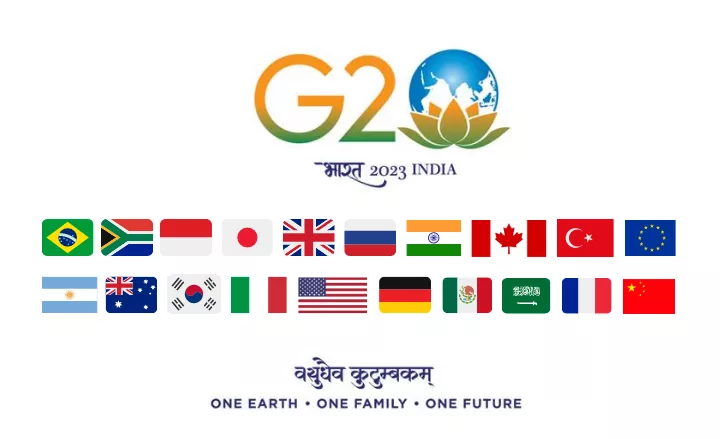Bengaluru, NFAPost: In the realm of international economic discourse, the Group of Twenty, popularly known as the G20, stands as a formidable force. Comprising twenty of the world’s most influential economies, both developed and developing, this collective wields significant influence in tackling global economic challenges. In this article, we embark on a comprehensive exploration of the G20 – its genesis, operational framework, and the pivotal role it plays on the world stage.
Unveiling the G20
- By the Numbers:
- 20 Members
- 2/3 of the World’s Population
- 85% of Global GDP
- Founded in 1999
- Inaugural Leader’s Meeting in 2008
Established in the aftermath of the Asian financial crisis in 1999, the G20 emerged as a vital platform for fostering dialogue and collaboration among its member nations. With Argentina, Australia, Brazil, Canada, China, France, Germany, India, Indonesia, Italy, Japan, Mexico, Russia, Saudi Arabia, South Africa, South Korea, Turkey, the United Kingdom, the United States, and the European Union in its ranks, the G20 boasts a formidable collective of economic powerhouses.
Crucial Functions of the G20
1. Economic Policy Coordination:
- At the heart of the G20’s mission is the coordination of economic policies among member countries. This concerted effort serves as a bulwark against potential destabilizers such as currency wars and trade protectionism.
- A pivotal moment in the G20’s history was its instrumental role during the 2008 financial crisis. Through coordinated stimulus packages and financial sector reforms, it played a pivotal role in stabilizing the global economy.
2. Financial Stability:
- The G20 champions financial stability through comprehensive approaches to issues such as banking regulations, cross-border financial flows, and the oversight of financial institutions.
- The establishment of the Financial Stability Board (FSB) epitomizes the G20’s commitment to vigilantly monitor and offer recommendations for the stability of the global financial system.
3. Trade and Investment:
- Central to the G20’s agenda is the promotion of free and equitable trade, along with the reduction of trade barriers and the facilitation of investments.
- G20 summits provide a pivotal platform for leaders to address trade disputes and advance multilateral trade negotiations.
4. Development and Inclusivity:
- The G20 acknowledges the imperative of development and inclusivity within its purview. It actively addresses critical issues including poverty reduction, sustainable development, and universal access to education and healthcare.
- Initiatives like the Compact with Africa signal the G20’s commitment to fostering economic development and improving the investment climate in African nations.
The G20 in Action
The G20’s operational rhythm is orchestrated through a series of meetings encompassing annual summits, deliberations among finance ministers, and specialized working groups. Here’s an insider’s look at how this dynamic entity operates:
Leaders’ Summit:
- The pinnacle of G20 proceedings is the annual Leaders’ Summit, an assembly of heads of state and government. Here, critical global issues are scrutinized, decisions are made, and joint communiqués are issued.
- Both formal and informal discussions ensue, setting the trajectory for the G20’s future endeavours.
Finance Ministers and Central Bank Governors:
- Periodic gatherings of finance ministers and central bank governors are integral in shaping economic and financial policies. These esteemed gatherings craft policy recommendations for the Leaders’ Summit.
- Focal areas include fiscal and monetary policy, as well as the preservation of international financial stability.
Working Groups:
- The G20 functions through a constellation of specialized working groups, each dedicated to dissecting distinct issues such as agriculture, energy, and climate change.
- Within these groups, experts and officials from member countries engage in collaborative efforts to formulate policies and recommendations.
In sum, the G20 stands as a linchpin in the orchestration of global economic discourse. With its diverse membership and strategic focus, it remains a beacon of hope in navigating the complexities of our interconnected world. As the G20 continues to evolve, its impact on the global economic landscape remains indispensable.





